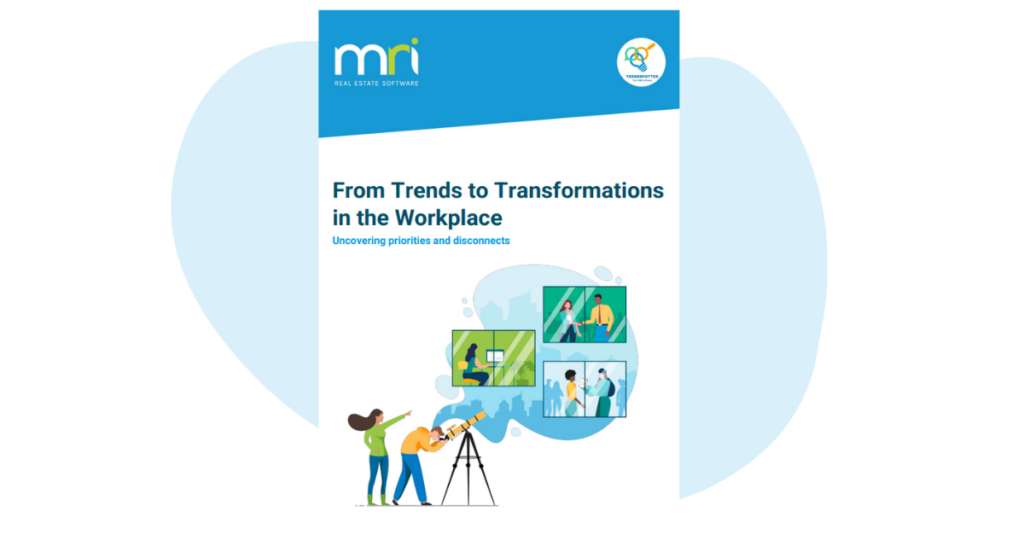The future of work: Reopening offices after COVID-19
When the Coronavirus pandemic first led businesses around the globe to close offices at the beginning of 2020, few would have expected that so many people would still be working remotely at the end of the year. But despite ongoing uncertainties and restrictions, the future is certainly looking brighter each day, especially as the rollout of the COVID-19 vaccine is already underway in the UK and North America, and the prospect of reopening offices after COVID-19 is sooner than ever. The pandemic has accelerated trends many expected to take off a few years down the road – namely, the reimagining of how office spaces will function and the rise of flexible workspaces.
In a panel moderated by Beth Schwartz, MRI’s Senior Director of Product Management, at our recent ‘Ascend Anywhere‘ virtual users conference, leading experts from across the real estate industry joined a panel to discuss “The Future of the Office” and how the pandemic is affecting trends in the sector. There were a few areas that the panel picked out as ones to watch, which will be of keen interest to both commercial landlords and corporate occupiers in the New Year.
Meeting the need for greater flexibility
While the return to the “old normal” appears to be on the horizon, it is unlikely to be the same workplace “normal” that existed before the pandemic. Having many people in the office only part of the time and teams spread across geographies is no longer the huge challenge it may have seemed in the past, and organizations have had the opportunity to test remote working scenarios while considering how to better utilize their physical spaces. As we move into a post-pandemic world, traditional work methods will likely make way for flexible working. Many people within businesses are far more likely to mix working at home with hot-desking rather than having their own full-time, fixed workspaces in the office.
The attitudes of many people – and employers – towards working remotely and being in the office have undergone a fundamental change now that they have seen how efficient working from home can be. Many office workers live a substantial distance from their workplace and faced a substantial commute before the pandemic. They have now seen how working at home – at least part of the time – has positively altered their work-life balance and in many cases improved their productivity, which is an encouragement for employers. During the pandemic, many people have only been venturing into the office one or two days a week even when lockdown restrictions have been lifted, a pattern that promises to become much more of the norm post-COVID.
We may also see more shared spaces where people can come together to collaborate on tasks and meeting goals. Another Ascend panelist, Robert Pavese, Partner at Atlanta Property Group, expects to see a post-COVID uptick in demand not just for flexible workspaces but spaces for “common area gatherings”, which he noted was already a trend before the crisis. “We have a lot of designs which we put on the shelf. We haven’t thrown anything away because I do think that it will come back – but everything is on hold right now.”
Modern-day amenities – plus safeguards
The Future of the Office panel kicked off by looking at a rise in a variety of amenities, designed into commercial properties and offered to tenants – a trend the panel saw continuing. Beth Schwartz noted that “things like onsite dining, specialty shops, gyms, activities like yoga and so forth” were emerging as key requirements for corporate occupiers and that employees were often looking at those amenities when deciding on a potential employer. Tim Curran, CEO of Building Engines, adds that those sorts of amenities – which have been pushed further into the mainstream of the modern workplace by coworking spaces such as WeWork – are no fad and are now seen as “fundamentally valuable to tenants.”
Panelist Scott Morey, Executive Director at One11 Advisors commented that many companies were looking beyond these sorts of amenities as a result of COVID. “We’ve seen a shift from amenity to necessity as tenants see more value in safety, security and transparency.” Indeed, while pre-coronavirus trends indicated a steep rise in amenities being designed into properties, employees now also want to make sure the facilities address factors such as how clean the air is, how safe building procedures are, how safely space management is handled, and other factors to help tenants feel comfortable in an office building.
The vital role of PropTech
In rethinking properties as we move out of the pandemic, PropTech will play an essential role in helping both building owners and occupiers understand how their employees are using workspace, what their working patterns are, how the building can be adapted to those – and using all this information to reconfigure existing commercial spaces or guide new developments. Another outcome of coronavirus is that it has accelerated the need for technology at almost all levels of work and space management. As Tim Curran noted, it is critical for businesses to now have “flexible software and processes in place” so that everyone can adapt to new ways of working and move forward together.
Forward-thinking leaders in the real estate industry will embrace PropTech solutions as they continue to deal with the fallout of the pandemic and its aftermath. By leveraging purpose-built digital tools, those landlords and tenants that move towards putting technology at the heart of their business will be able to unlock a new depth of understanding that enhances property use and efficiency. The reality is that operating a building safely, efficiently and effectively is no easy task, and there has never been a time more important than now to create a foundation of agility and adaptability.
Watch the on-demand webinar to learn how space management software can help you in reopening offices after COVID-19.
From Trends to Transformations in the Workplace – Uncovering Priorities and Disconnects
In partnership with CoreNet Global, MRI Software conducted a survey of real estate professionals around the world to examine emerging trends in office transformations. These insights provide a global perspective, with input from the APAC, EMEA, North…

